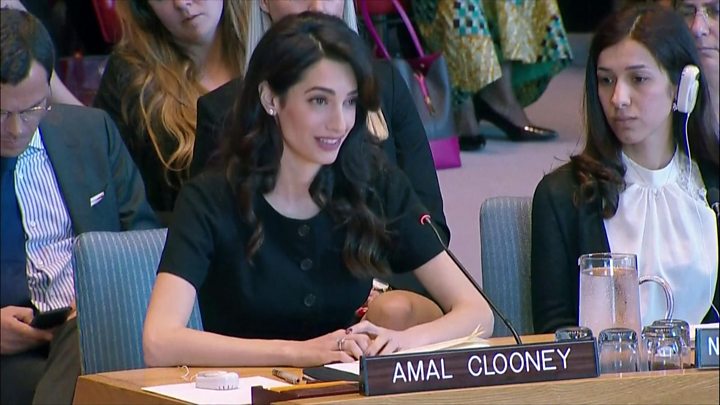
The Trump administration’s opposition to abortion has led to the watering-down of a UN resolution on ending sexual violence in war.
The US removed all references to sexual and reproductive health.
The Security Council resolution, submitted by Germany, dropped all such references. The US, along with China and Russia, had threatened to veto it.
The Trump administration opposed a phrase on the grounds that it implies support for abortion.
The amended resolution passed 13-0, with Russia and China abstaining.
French UN ambassador Francois Delattre was scathing of the decision to exclude the reference to sexual health, saying it undermined the dignity of women.
“It is intolerable and incomprehensible that the Security Council is incapable of acknowledging that women and girls who suffered from sexual violence in conflict, and who obviously didn’t choose to become pregnant, should have the right to terminate their pregnancy,” he said.
The removed phrase read: “Recognizing the importance of providing timely assistance to survivors of sexual violence, urges United Nations entities and donors to provide non-discriminatory and comprehensive health services, in line with Resolution 2106.”
This line was thought to be a compromise from an earlier version, which included a more detailed description of the health services, “including sexual and reproductive health, psychosocial, legal, and livelihood support”.
This language had been used before in previous resolutions related to sexual violence, US media report.
- Sierra Leone declares rape emergency
- World powers condemn new Libya fighting
- Nobel Peace Prize for anti-rape activists
The new resolution condemns the use of rape as a weapon of war and expresses the Security Council’s concern at the slow progress in addressing sexual violence in conflict.
Image copyright
Getty Images
Jonathan Cohen, acting US ambassador to the United Nations, at the Security Council meeting
But while it urges improved justice for victims, the final version also removed a reference to a UN monitoring body that would report acts of sexual violence.
The initial resolution had garnered widespread support. Human rights lawyer Amal Clooney attended Tuesday’s Security Council meeting and urged members to vote in favour.
“This is your Nuremberg moment,” Mrs Clooney said. “Your chance to stand on the right side of history.”
Ms Clooney was joined by two 2018 Nobel Peace Prize winners, both anti-rape activists: Congolese gynaecologist Denis Mukwege and Nadia Murad, an Iraqi Yazidi who was tortured and raped by Islamic State militants.
German foreign minister Heiko Maas also joined actress and activist Angelina Jolie in writing an article in the Washington Post on 22 April advocating the resolution.
Image copyright
EPA
Nobel Peace Price Winners Nadia Murad and Denis Mukwege both supported the UN resolution
International figures have denounced the US for weakening the resolution.
UK Labour MP Emily Thornberry cited the resolution as cause for concern in light of President Donald Trump’s recently announced visit to the UK.
“It beggars belief that on the very same day Donald Trump is threatening to veto a United Nations resolution against the use of rape as a weapon of war, Theresa May is pressing ahead with her plans to honour him with a state visit to the UK,” Ms Thornberry, the opposition’s spokesperson on foreign affairs said.
The US was represented by acting ambassador to the US, Jonathan Cohen. The ambassador post has remained vacant since the resignation of Nikki Haley last year.
Mr Trump nominated Kelly Knight Craft, current US ambassador to Canada, for the job in February.
United States dilutes UN rape-in-war resolution

